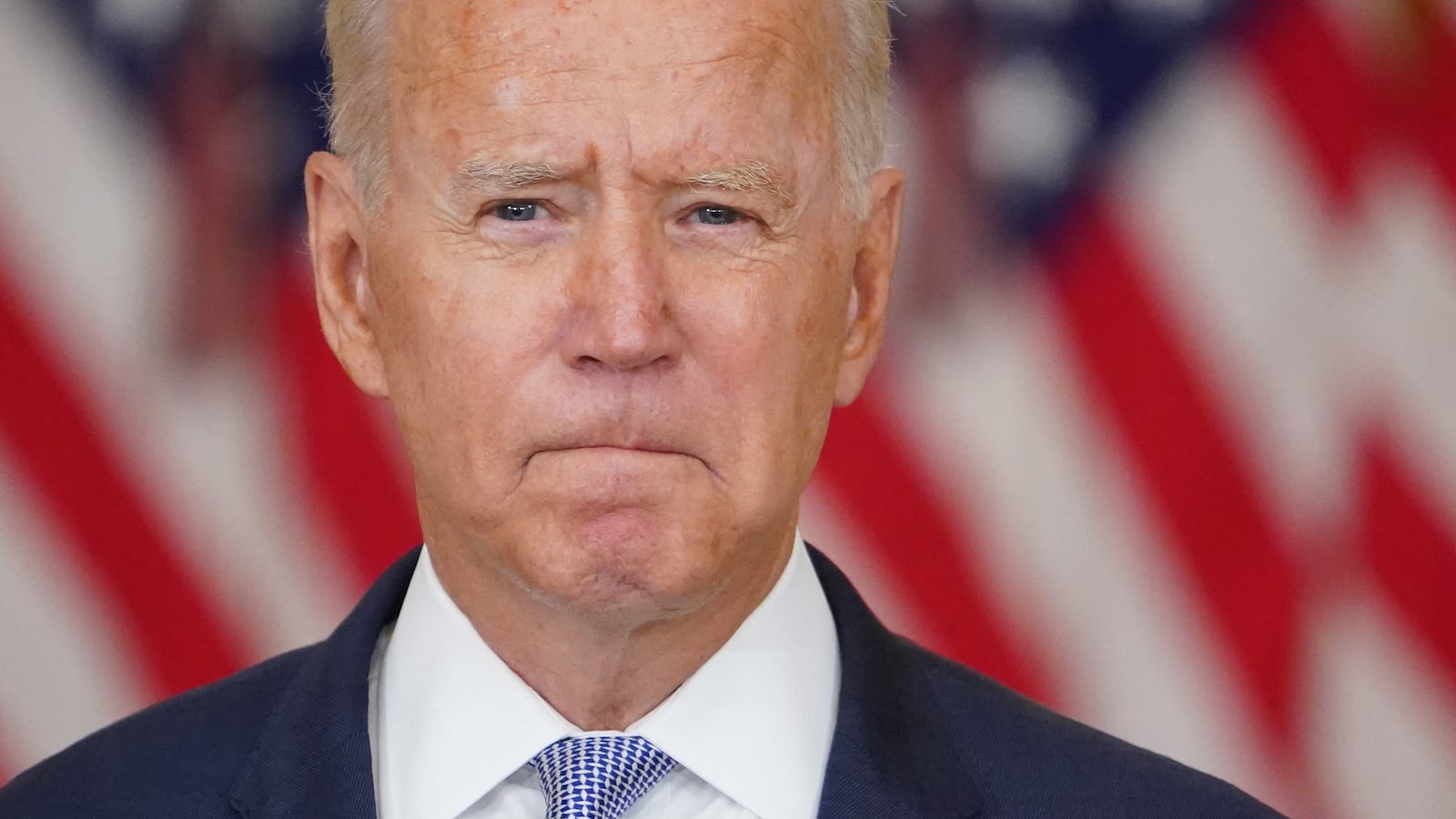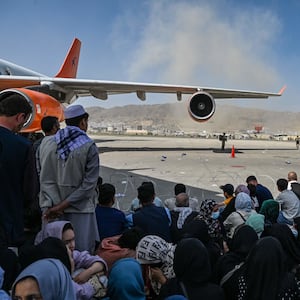For two decades, the United States has tried to create a stable, secure Afghanistan, President Joe Biden told the nation on Monday. But in the end, the president asserted, the Afghan government just didn’t want it enough.
As thousands of people desperately seek means of escape from the once again ascendant Taliban in Afghanistan, Biden acknowledged that both Republican and Democratic administrations shared blame for the chaotic end of the American occupation of Afghanistan—but saved his harshest criticism for Afghan leadership and security forces, declaring forcefully that U.S. troops could not be expected to fight and die in a war “that Afghan forces are not willing to fight themselves.”
While saddened, Biden said he did not regret the decision to pull out of Afghanistan and insisted that the bloodshed could have been brought to an end years before.
“We never gave up the hunt for Osama bin Laden and we got him. That was a decade ago,” Biden said. “Our mission in Afghanistan was never supposed to have been nation-building.”
He added there was “never a good time to withdraw U.S. forces,” and said he could not ask American troops to “fight on endlessly in another country’s civil war.”
“The events we are seeing now are sadly proof that no amount of military force would ever deliver a stable, united, secure Afghanistan, that’s known in history as the graveyard of empires,” Biden said. “I will not mislead the American people by claiming that just a little more time in Afghanistan will make all the difference.”
Speaking from the East Room of the White House after cutting short a planned stay at Camp David, the president largely repeated the same talking points that Secretary of State Antony Blinken had made the day before—that the U.S. mission in the country was originally to fight Al Qaeda rather than build a stable democracy, that a delay in military withdrawal would mean all-out war with the Taliban, and that while the collapse of the Afghan government “did unfold more quickly than we anticipated,” the U.S. government actually planned for every contingency.
But the White House’s narrative had sharpened in the day since Kabul fell to Taliban forces, with Biden casting the blame for the deteriorating situation on the ground in Afghanistan on the country’s U.S.-backed political leaders, particularly ousted Afghan President Ashraf Ghani, who “gave up and fled the country.”
“The political leaders of Afghanistan were unable to come together for the good of their people,” Biden said, claiming those leaders were overly optimistic that the Afghan security forces—which, at least on paper, dwarfed the Taliban’s own—could hold the country.
“Mr. Ghani insisted the Afghan forces would fight, but obviously he was wrong,” Biden added.
Biden noted that the U.S. government had spent close to $90 billion training and equipping “a force larger in size than that of many of our NATO allies,” only for those forces to fall apart in a matter of days, and mentioned the approaching 20-year mark of the terrorist attacks that prompted the U.S. invasion of Afghanistan in 2001, vowing not to hand off the war to yet another American president.
While admitting that the United States was behind “many missteps over the past two decades” in Afghanistan, the president did not concede that it was a mistake to withdraw almost all U.S. troops before successfully evacuating American citizens, Special Immigrant Visa (SIV) applicants, and other individuals vulnerable to Taliban retribution.
Noting that the U.S. has moved roughly 2,000 Afghans who are eligible for SIVs and their families out of the country, and promising more assistance for the roughly 18,000 that remain, Biden acknowledged there were concerns about why we did not begin evacuating Afghan civilians sooner, but—once again—said it was a few Afghans who were truly at fault.
“Some of the Afghans did not want to leave earlier,” Biden said, repeating an administration talking point that had been shared with Democratic allies in Congress earlier in the day declaring that some SIV applicants were “still hopeful” that the central government could prevail.
A mass evacuation, Biden further added, risked triggering “a crisis of confidence” in a government that collapsed in a matter of hours on Sunday.
Advocates for the interpreters, translators, drivers, security guards and fixers who risked their lives to support U.S. troops and embassy personnel in the country in exchange for SIV eligibility told The Daily Beast that Biden’s contention was extremely dubious.
“The administration’s claim that many Afghans did not want to leave the country earlier is inconsistent with our experience working with Afghan allies,” said Krish O’Mara Vignarajah, president and CEO of Lutheran Immigration and Refugee Service. “We have been in touch with countless SIV recipients who have been desperate to leave Afghanistan for months and have not been able to due to a backlog in visa processing, insufficient financial resources, and inadequate flight accessibility through international organizations.”
The scene in Kabul one day after the Taliban seized the city further undercut the notion that Afghans were adopting a "wait and see" approach to the government’s collapse. Early Monday, video footage at Kabul’s international airport showed panicked Afghans desperately trying to grab onto the exterior of an outbound American military jet hours after the nation’s president, Ashraf Ghani, fled the country.
At least seven people were reported dead amid the turmoil, some having fallen from airborne planes.








